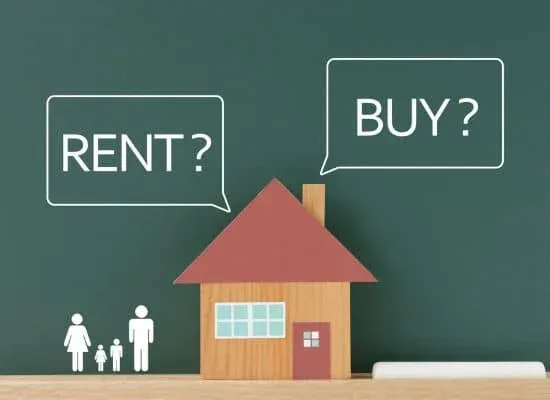Renting vs. Buying: Which Is Better for Canadians in 2025?

Navigating the Canadian housing landscape in 2025 feels like charting a course through a stormy sea—full of unpredictable waves, hidden costs, and shifting winds.
For many, the choice between renting vs. buying a home defines not just where they’ll live but how they’ll build their financial future.
With home prices still lofty in urban centers, interest rates fluctuating, and rental markets tightening, this decision demands more than a gut check.
It requires a sharp lens on economics, lifestyle, and long-term goals.
So, what’s the smarter move for Canadians this year?
Let’s dive into the nuances, weigh the trade-offs, and uncover which path aligns with your reality.
In addition to financial considerations, personal circumstances play a crucial role in this decision.
Factors like job stability, family needs, and future plans can significantly influence whether renting or buying is the better option.
The Economic Snapshot: Canada’s Housing Market in 2025
Picture Canada’s housing market as a high-stakes chess game.
Home prices, while cooling slightly in some regions, remain steep in cities like Vancouver and Toronto.
According to a 2025 Zoocasa report, the average monthly mortgage payment in Vancouver is $5,404, compared to $3,031 for rent—a 44% savings for renters.
Meanwhile, interest rates, hovering around 4-5% for five-year fixed mortgages, add pressure to buyers but also signal potential relief as the Bank of Canada eyes cuts in late 2025.
Renters, however, face their own squeeze: rents jumped 8% in 2024, with cities like Calgary and Edmonton seeing fierce competition due to population growth.
This tug-of-war between ownership and tenancy shapes every Canadian’s decision.
Buyers chase equity and stability, while renters value flexibility and lower upfront costs.
But the choice isn’t binary—it’s deeply contextual.
Let’s break it down.
The ongoing changes in the housing market highlight the importance of staying informed.
Websites like Canadian Real Estate Association (CREA) provide valuable insights and statistics that can help potential buyers and renters make informed decisions.
Financial Trade-Offs: Crunching the Numbers
Money talks loudest in the renting vs. buying debate.
Buying a home is often pitched as an investment, but it’s not a golden ticket.
Upfront costs—down payments, closing fees, and land transfer taxes—can drain savings.
For a $800,000 home in Toronto, a 20% down payment is $160,000, plus roughly $20,000 in closing costs.
Monthly mortgage payments, property taxes, and maintenance add up fast.
A 25-year mortgage at 4.5% on $640,000 yields a monthly payment of about $3,560, excluding taxes and upkeep.
Renters, by contrast, dodge these upfront hurdles.
In Toronto, a two-bedroom apartment averages $3,200 monthly, with no property taxes or maintenance fees.
Over five years, renting saves significant cash flow, especially in high-cost cities.
But there’s a catch: rent payments build no equity.
Every dollar goes to the landlord, not your net worth.
Here’s a side-by-side comparison for a $800,000 home vs. a comparable rental in Toronto:
| Factor | Buying | Renting |
|---|---|---|
| Upfront Cost | $180,000 (down payment + fees) | $6,400 (first/last month) |
| Monthly Cost | $4,200 (mortgage + taxes) | $3,200 |
| Maintenance | $500/month (est.) | $0 |
| Equity Built (5 years) | ~$100,000 | $0 |
| Flexibility | Low | High |
This table assumes stable rates and prices, but markets shift.
Buyers betting on appreciation could win big—or lose if prices stagnate.
Renters, meanwhile, risk rent hikes but preserve liquidity.
Example 1: Priya’s Dilemma
Priya, a 32-year-old tech professional in Vancouver, earns $90,000 annually.
She’s torn between buying a $600,000 condo or renting a similar unit for $2,800 monthly.
Buying requires a $120,000 down payment, wiping out her savings, and monthly costs of $3,500 (mortgage, strata fees, taxes).
Renting leaves her $700 monthly to invest or save.
Priya values mobility for career opportunities, so renting aligns better, letting her invest in a TFSA for future flexibility.
In the long run, understanding these financial trade-offs is essential for making a decision that aligns with your personal goals.
Consulting with a financial advisor can provide tailored advice based on individual circumstances.

Lifestyle and Flexibility: Beyond the Balance Sheet
Numbers don’t tell the whole story.
Lifestyle shapes the renting vs. buying choice as much as finances.
Homeownership roots you to a place, offering stability and a canvas for personal expression.
You can renovate, garden, or build a community without a landlord’s permission.
But it’s a tether.
Selling a home takes time and money, limiting mobility.
Renting, conversely, is like a lightweight backpack—you can pick up and go.
Job transfers, life changes, or a desire to explore new neighborhoods are easier without a mortgage anchor.
Yet, renters face uncertainty: leases end, rents rise, and landlords can reclaim properties.
In 2025, with vacancy rates in major cities like Toronto at 1.5%, finding a stable rental is no cakewalk.
Ask yourself: does the freedom to move outweigh the pride of ownership?
For young professionals or newcomers, renting often wins.
Families seeking long-term roots may lean toward buying, especially in affordable markets like Winnipeg, where mortgage and rent costs are nearly equal.
Ultimately, balancing lifestyle needs with financial realities is key to making the right choice.
Consider your personal values and priorities when evaluating the renting vs. buying dilemma.
+ How to Build Good Credit as a Newcomer to Canada
Long-Term Wealth: Equity vs. Opportunity Cost
Homeownership is often sold as a wealth-building machine, but it’s not a universal truth.
Buying builds equity, especially if prices rise.
In Calgary, where homes appreciated 6% annually from 2020-2024, a $500,000 home could gain $150,000 in value by 2029.
But equity isn’t liquid—you can’t spend it without selling or borrowing.
And if prices flatline, as some predict for Vancouver in 2025, gains may stall.
Renters miss equity but gain opportunity.
The money saved on down payments and maintenance can fuel investments.
A disciplined renter investing $500 monthly at a 7% annual return could amass $34,000 in five years.
The catch? Most Canadians don’t invest their savings—they spend them.
Renting only builds wealth if you’re strategic.
Example 2: The Nguyen Family
The Nguyens, a family of four in Halifax, considered buying a $450,000 home in 2025.
With a $90,000 down payment and $2,800 monthly costs, they’d build equity but strain their budget.
Renting a similar home for $2,200 leaves $600 monthly for RRSPs and RESPs.
They chose renting, prioritizing education savings and financial cushion over ownership, especially with Halifax’s stable rental market.
Understanding the potential for long-term wealth accumulation through both renting and buying can empower individuals to make informed decisions.
Educating yourself on investment options is crucial for maximizing your financial future.

Market Trends: Regional Realities in 2025
Canada’s housing market isn’t monolithic.
Regional differences tilt the renting vs. buying scales.
In Vancouver and Toronto, sky-high prices make renting more affordable short-term.
Zoocasa’s 2025 analysis shows renters in Vancouver save $2,373 monthly compared to owners.
But in Regina or Winnipeg, where mortgage payments nearly match rents, buying makes sense for long-term residents.
Emerging trends add complexity.
The federal government’s 2025 plan to reduce temporary residents from 6.5% to 5% of the population by 2027 could ease rental demand, potentially cooling rent growth.
Meanwhile, expected interest rate cuts may boost home sales, nudging prices upward.
Buyers in affordable markets like Halifax ($2,436 monthly mortgage) or Windsor ($2,441) may find 2025 a sweet spot to enter.
Here’s a regional snapshot for 2025:
| City | Avg. Home Price | Monthly Mortgage | Avg. Rent (2-Bed) | Rent Savings |
|---|---|---|---|---|
| Vancouver | $1,200,000 | $5,404 | $3,031 | $2,373 |
| Toronto | $1,000,000 | $4,500 | $3,200 | $1,300 |
| Winnipeg | $350,000 | $1,580 | $1,542 | $38 |
| Halifax | $500,000 | $2,436 | $2,200 | $236 |
Staying informed about regional trends can help prospective buyers and renters make better choices.
Local real estate boards and market reports are excellent resources for understanding these dynamics.
++ Bank of Canada Interest Rate Decision: What June 2025 Means for Your Finances
Hidden Costs and Risks: The Fine Print
Buying’s hidden costs can blindside you.
Maintenance—think roof repairs or HVAC replacements—averages 1-2% of a home’s value annually.
Condo fees, rising 5-10% yearly in urban centers, add another layer.
Then there’s market risk: a 2025 slowdown could trap buyers with underwater mortgages.
Renters aren’t immune.
Rent control loopholes in some provinces allow steep increases when tenants leave.
In Ontario, new leases face no caps, exposing renters to market swings.
Plus, the emotional toll of evictions or renovictions—landlords reclaiming units for “renovations”—looms large in tight markets.
Understanding these hidden costs and risks is essential for both renters and buyers.
Being proactive about potential pitfalls can save you from costly surprises down the line.
The Intangibles: Stability vs. Freedom
Beyond dollars, renting vs. buying shapes your sense of place.
Owning a home offers emotional security—a sanctuary you control.
Renting, while flexible, can feel transient, especially if you face frequent moves.
For immigrants or young Canadians, renting may bridge the gap to ownership, while established families may prioritize the permanence of a deed.
Reflecting on what stability and freedom mean to you is vital in this decision-making process.
Consider how each option aligns with your life goals and aspirations.
Making Your Move: A Decision Framework
So, which path wins in 2025?
It depends on you.
If you’re in a high-cost city, value mobility, or lack a hefty down payment, renting often makes sense.
If you’re in an affordable market, plan to stay put, and can handle upfront costs, buying could be your ticket to wealth-building.
Consider these questions:
- How long will you stay in one place?
- Can you afford a 20% down payment without gutting your savings?
- Are you disciplined enough to invest rent savings?
The renting vs. buying choice is like choosing between a marathon and a sprint—both get you somewhere, but the pace and payoff differ.
In 2025, Canadians must weigh costs, lifestyle, and market trends with clear eyes.
Whether you sign a lease or a mortgage, make it a move that fits your life’s bigger picture.
Taking the time to evaluate your priorities and circumstances will lead you to the best decision for your unique situation.
Remember, this choice is about more than just finances; it’s about creating a fulfilling life.
